Photo: Burak Cingi/Redferns
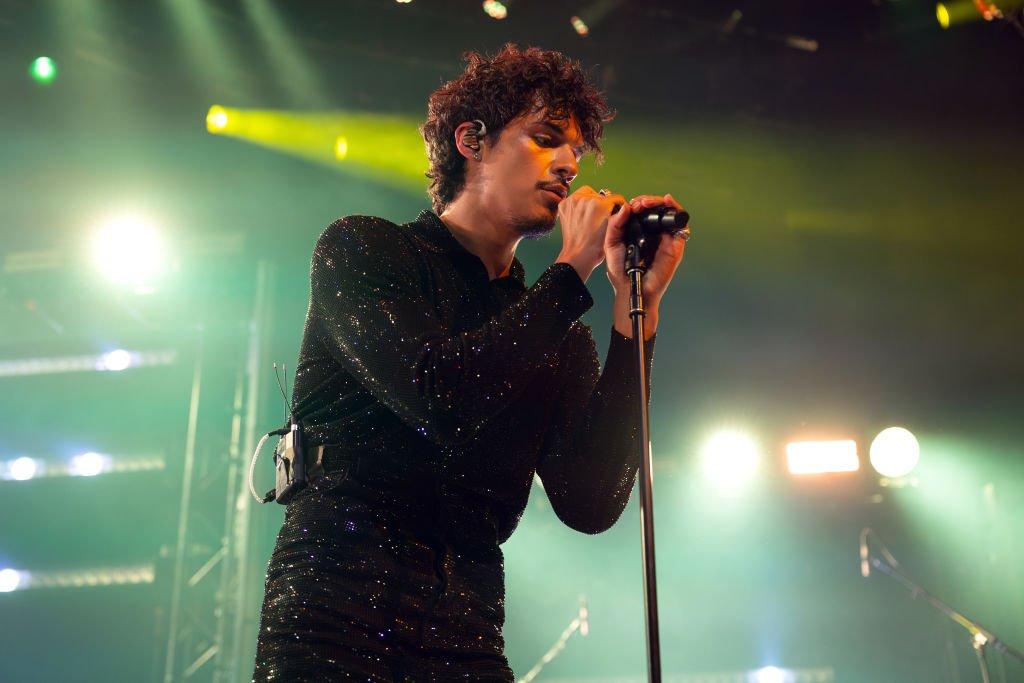
news
On Omar Apollo's New EP 'Live for Me,’ Limitless Experimentation Created Catharsis
Omar Apollo has made longing his bread and butter, often singing about unrequited love and the complexities of romantic relationships. But on ‘Live for Me’, he flips the script.
In the ever-evolving landscape of music, where artists strive to carve their niche and leave their mark, Omar Apollo has emerged as a formidable force. In six short years (with a pandemic in the middle), the Chicano star has risen from humble beginnings to GRAMMY nominee, captivating listeners around the world with his distinctive blend of genres, unforgettable voice, and lyrics that tug at the heartstrings.
His new EP, Live For Me, out Oct. 6, is the perfect amalgamation of the above. With just four tracks — "Ice Slippin," "Live For Me," "Angel" and "Pilot" — the project is a small but sturdy bridge into Apollo’s next chapter. "These four songs are about letting go of the old in order to become my new self and salvage whatever purity I had left," Apollo tells GRAMMY.com. "[It’s my] coming to terms and addressing parts of me that I had compartmentalized."
While some might have been expecting a longer-form project following the success of his 2022 debut album Ivory and Best New Artist nomination at the 2022 GRAMMYs, the succinct nature of an EP made sense to Apollo. "I know it's only four songs," he tells GRAMMY.com, "but they hold a lot of the weight I've been carrying throughout my life. I feel lighter now and ready for the next phase of whatever life has to offer."
Apollo has been carrying a heavy musical history throughout much of his young life. The 26-year-old grew up in Hobart, Indiana, listening to everything from Vicente Fernández and Juan Gabriel to Lauryn Hill and Prince. He began his own musical journey as tween, when he traded an electric guitar his parents had gifted him for an acoustic one and learned to play through YouTube covers and guidance from one of his tíos.
When he was 17, Apollo experienced a serendipitous moment at a music store. "There was a little microphone there that said, 'Make music.' And I was like, 'Damn, I want to make music,'" he recounted to NPR. The realization made him get a job at McDonald's, where he miraculously saved up enough to get a tiny studio setup.
Apollo's early tracks reflected his eclectic tastes and influences, featuring a unique blend of R&B, soul, pop, and indie rock that would later become his signature sound. From those early days, Apollo began weaving his life stories into every song he created — no matter how poignant or negligible. On "Brakelights," Apollo turns an ode to his beaten-up car into a poem about unrequited love — one of the singer's trademarks.
Apollo's breakthrough came in 2017 after he borrowed $30 from a friend to upload "Ugotme" onto Spotify. The song was immediately added to the streamer's Fresh Finds playlist and, within a day, garnered tens of thousands of streams. As royalties from "Ugotme" and other tracks slowly trickled in, Apollo realized music could be a viable career, to the dismay of his parents.
"It was tough for them at first to understand," Apollo told GRAMMY.com earlier this year. "If I was living in Mexico and crossed the border illegally so my kids could have a better life, and then my kid wakes up one day and is like, ‘Oh, I wanna be a singer,’ I would be stressed out too. I never blamed them for it."
While it might not have seemed like much of a career, people were taking notice of Omar Apollo. Months after "Ugotme" blew up, Apollo linked up with soon-to-be-manager Dylan Shanks on Twitter. Shanks bridged the gap between the Los Angeles industry and the Indiana attic full of "asbestos and black mold" where Apollo lived with four other people and had set up his home studio.
Apollo's attic sessions saw the light of day in his 2018 debut EP, Stereo, which featured guitar-heavy tracks like the hazy "Erase" and the funky "Hijo de Su Madre." Aside from giving us a taste of his genre-hopping, the EP also showcased Apollo's ability to seamlessly switch between Spanish and English, which resonated with a diverse audience.
He continued this vein with the release of Friends in 2019. Bass-heavy tracks like "Kickback" and disco-tinged "So Good" incorporated even more elements of funk and neo-soul into his repertoire, with an acoustic core ("Friends," "There for Me," "Hearing Your Voice") showcasing his versatility.
Later that year, Apollo collaborated with in-demand producer Kenny Beats on singles "Frío," an all-Spanish track with reggaeton sensibilities, and the groovy rap-adjacent "Hit Me Up" featuring "Euphoria"'s Dominic Fike. These collaborations expanded his musical horizons and contributed to his rising success.
In 2020, Apollo released his debut mixtape, Apolonio. Featuring standouts like the R&B-infused track "Stayback" and indie gem "Kamikaze," Apolonio marked an inflection point: Not only did the album receive critical acclaim and catapult him into the mainstream, but it also demonstrated his artistic growth. Thematically, Apollo's lyrics were more painfully self-aware and personal. Sonically, mixing became even more eclectic, combining his tried-and-true soul and funk tendencies with poppier inflections and bleeding over to trap and Mexican corrido.
Much like his hair — which changed color at least four times during this period — Apollo was finding comfort in the transitory and experimental.
With more steam and eyes on him than ever before, Apollo joined forces with Spanish crooner C. Tangana on "Te Olvidaste," off his sophomore studio album El Madrileño. The song received two nominations at the 22nd Latin GRAMMYs, including Record Of The Year. The collaboration streak continued with the first hints of what would become Ivory. The soulful heartbreak ballad "Bad Life," Apollo's second song with Kali Uchis, ushered in 2022 for the budding star. The next month, he released "Invincible" featuring Daniel Caesar, a minimalist track carried by guitar strums and plucks, suave drum and bass, and, above all, the singers' tender harmonies.
Apollo's debut studio album, Ivory, which he dubbed as his magnum opus to Rolling Stone, finally arrived in April 2022. Mainly produced with the help of Carter Lang (who is best known for his work on SZA’s Ctrl and SOS), the project showcased Apollo’s genre-blending prowess and songwriting skills. However, the Ivory that we first listened to was not the Ivory that Apollo first created.
"I scrapped the first album because I hated it," he told GRAMMY.com earlier this year. "I wasn't excited to perform it. Everything was post-rationalized; it didn't have any theme. It was just me linking up with a bunch of producers and then putting whatever happened in those two months all together. It didn't feel like me by any means."
Speaking to Complex shortly after the album's release, Apollo confirmed that the only songs "from the vault" that made it to Ivory's final form were "Bad Life," "Waiting On You," and "Mr. Neighbor."
To complete the record, he embarked on a journey of self-discovery, isolating himself in houses he rented in California and New York with his sound engineer and childhood best friend, Manuel Barajas. While largely hunkering down on alt-R&B and psych-soul, Ivory best demonstrates Apollo's willingness to explore new sonic territories with the goal of crafting truly representative songs.
The album includes Apollo's best corrido to date, the emotional "En El Olvido," as well as the Spanglish trap anthem "Tamagotchi." On the latter, Pharrell Williams' unmistakable four-count start makes it obvious that this is a Neptunes production.
Upon its release, Ivory entered the Billboard 200 chart — a first for Apollo. Almost half a year after the album's release, deep-cut "Evergreen" went viral on TikTok. Apollo made the song in a day during his retreat. "It was so simple. Being far away from everybody, not having access to do things, things become clear," he told Billboard.
The song earned Apollo his first-ever entry on the Billboard Hot 100 chart. In November 2022, Apollo would receive a GRAMMY nomination for Best New Artist.
"In the beginning … I didn't even think I was a person who could win a GRAMMY. It was just kind of survival mode," Apollo said to Insider. "[But] I really went for it with this last album. So I definitely was hoping for sure, in the back of my head, like, 'That would be crazy if I got nominated.' And it happened, and it was just insane."
Although Apollo did not win Best New Artist (that honor went to singer Samara Joy), he continued to move forward in his personal and professional growth. Live For Me is proof of his unapologetic nature and growing vulnerability, which, among other things, manifests in openly addressing his sexuality.
"Making music is very vulnerable, and I always used to feel kind of embarrassed when I played things for people," he told Complex "I used to get so annoyed when somebody would ask me to explain what a song is about. But now, I'm willing to explain and willing to talk about it. I'm not embarrassed."
Apollo's recent releases take his authenticity a step further. "When I first started writing songs, I would often write about unrequited love. Eventually, I wrote songs about the complexities that come with a relationship," the artist said in a statement announcing his new single "3 Boys." The slow doo-wop jam marked Apollo's"first time writing about something non-monogamous" and signaled a pitstop into his new "new era," as he himself put it on Instagram.
The Live For Me track "Ice Slippin" is Apollo at his rawest. Heavy on autotune and drum pads, the piano-led vibey track is inspired by the experience of coming out to his family. "This song is a reflection and reaction of all the emotions I had to face before and after I decided to leave the icy streets of Indiana," the artist shared in a press release.
If Ivory was Apollo "trying to access [the] broken, traumatized parts of me to sell it to the masses," then Live For Me is focused on inner healing. Amid pen, paper, arpeggios and distorted adlibs, Apollo finds solace and, of course, life.

Photo: Aitor Laspiur
interview
Omar Apollo Embraces Heartbreak And Enters His "Zaddy" Era On 'God Said No'
Alongside producer Teo Halm, Omar Apollo discusses creating 'God Said No' in London, the role of poetry in the writing process, and eventually finding comfort in the record's "proof of pain."
"Honestly, I feel like a zaddy," Omar Apollo says with a roguish grin, "because I'm 6'5" so, like, you can run up in my arms and stay there, you know what I mean?"
As a bonafide R&B sensation and one of the internet’s favorite boyfriends, Apollo is likely used to the labels, attention and online swooning that come with modern fame. But in this instance, there’s a valid reason for asking about his particular brand of "zaddyhood": he’s been turned into a Bratz doll.
In the middle of June, the popular toy company blasted a video to its nearly 5 million social media followers showing off the singer as a real-life Bratz Boy — the plastic version draped in a long fur coat (shirtless, naturally), with a blinged-out cross necklace and matching silver earrings as he belts out his 2023 single "3 Boys" from a smoke-covered stage.
The video, which was captioned "Zaddy coded," promptly went viral, helped along by an amused Apollo reposting the clip to his own Instagram Story. "It was so funny," he adds. "And it's so accurate; that's literally how my shows go. It made me look so glamorous, I loved it."
The unexpected viral moment came with rather auspicious timing, considering Apollo is prepping for the release of his hotly anticipated sophomore album. God Said No arrives June 28 via Warner Records.
In fact, the star is so busy with the roll-out that, on the afternoon of our interview, he’s FaceTiming from the back of a car. The day prior, he’d filmed the music video for "Done With You," the album’s next single. Now he’s headed to the airport to jet off to Paris, where he’ll be photographed front row at the LOEWE SS25 men’s runway show in between Sabrina Carpenter and Mustafa — the latter of whom is one of the few collaborators featured on God Said No.
Apollo’s trusted co-writer and producer, Teo Halm, is also joining the conversation from his home studio in L.A. In between amassing credits for Beyoncé (The Lion King: The Gift), Rosalía and J Balvin (the Latin GRAMMY-winning "Con Altura"), SZA ("Notice Me" and "Open Arms" featuring Travis Scott) and others, the 25-year-old virtuoso behind the boards had teamed up with Apollo on multiple occasions. Notably, the two collabed on "Evergreen (You Didn’t Deserve Me At All)," which helped Apollo score his nomination for Best New Artist at the 2023 GRAMMYs.
In the wake of that triumph, Apollo doubled down on their creative chemistry by asking Halm to executive produce God Said No. (The producer is also quick to second his pal’s magnetic mystique: "Don't get it twisted, he's zaddy, for sure.")
Apollo bares his soul like never before across the album’s 14 tracks, as he processes the bitter end of a two-year relationship with an unnamed paramour. The resulting portrait of heartbreak is a new level of emotional exposure for a singer already known for his unguarded vulnerability and naked candor. (He commissioned artist Doron Langberg to paint a revealing portrait of him for the cover of his 2023 EP Live For Me, and unapologetically included a painting of his erect penis as the back cover of the vinyl release.)
On lead single "Spite," he’s pulled between longing and resentment in the wake of the break-up over a bouncing guitar riff. Second single "Dispose of Me" finds Apollo heartsick and feeling abandoned as he laments, "It don’t matter if it’s 25 years, 25 months/ It don’t matter if it’s 25 days, it was real love/ We got too much history/ So don’t just dispose of me."
Elsewhere, the singer offers the stunning admission that "I would’ve married you" on album cut "Life’s Unfair." Then, on the very next song — the bumping, braggadocious "Against Me" — Apollo grapples with the reality that he’s been permanently altered by the love affair while on the prowl for a rebound. "I cannot act like I’m average/ You know that I am the baddest bitch," he proclaims on the opening verse, only to later admit, "I’ve changed so much, but have you heard?/ I can’t move how I used to."
More Omar Apollo News & Videos

Omar Apollo Embraces Heartbreak And Enters His "Zaddy" Era On 'God Said No'

How Danna Paola Created 'CHILDSTAR' By Deconstructing Herself

On Omar Apollo's New EP 'Live for Me,’ Limitless Experimentation Created Catharsis

Listen To GRAMMY.com's LGBTQIA+ Pride Month 2023 Playlist Featuring Demi Lovato, Sam Smith, Kim Petras, Frank Ocean, Omar Apollo & More

Omar Apollo On “Evergreen,” Growth & Longing
Given the personal subject matter filling God Said No — not to mention the amount of acclaim he earned with Ivory — it would be understandable if Apollo felt a degree of pressure or anxiety when it came to crafting his sophomore studio set. But according to the singer, that was entirely not the case.
"I feel like I wouldn’t be able to make art if I felt pressure," he says. "Why would I be nervous about going back and making more music? If anything, I'm more excited and my mind is opened up in a whole other way and I've learned so much."
In order to throw his entire focus into the album’s creation, Apollo invited Halm to join him in London. The duo set up shop in the famous Abbey Road Studios, where the singer often spent 12- to 13-hour days attempting to exorcize his heartbreak fueled by a steady stream of Aperol spritzes and cigarettes.
The change of scenery infused the music with new sonic possibilities, like the kinetic synths and pulsating bass line that set flight to "Less of You." Apollo and Halm agree that the single was directly inspired by London’s unique energy.
"It's so funny because we were out there in London, but we weren't poppin' out at all," the Halm says. "Our London scene was really just, like, studio, food. Omar was a frickin' beast. He was hitting the gym every day…. But it was more like feeding off the culture on a day-to-day basis. Like, literally just on the walk to the studio or something as simple as getting a little coffee. I don't think that song would've happened in L.A."
Poetry played a surprisingly vital role in the album’s creation as well, with Apollo littering the studio with collections by "all of the greats," including the likes of Ocean Vuong, Victoria Chang, Philip Larkin, Alan Ginsberg, Mary Oliver and more.
"Could you imagine making films, but never watching a film?" the singer posits, turning his appreciation for the written art form into a metaphor about cinema. "Imagine if I never saw [films by] the greats, the beauty of words and language, and how it's manipulated and how it flows. So I was so inspired."
Perhaps a natural result of consuming so much poetic prose, Apollo was also led to experiment with his own writing style. While on a day trip with his parents to the Palace of Versailles, he wrote a poem that ultimately became the soaring album highlight "Plane Trees," which sends the singer’s voice to new, shiver-inducing heights.
"I'd been telling Teo that I wanted to challenge myself vocally and do a power ballad," he says. "But it wasn't coming and we had attempted those songs before. And I was exhausted with writing about love; I was so sick of it. I was like, Argh, I don't want to write anymore songs with this person in my mind."
Instead, the GRAMMY nominee sat on the palace grounds with his parents, listening to his mom tell stories about her childhood spent in Mexico. He challenged himself to write about the majestic plane tree they were sitting under in order to capture the special moment.
Back at the studio, Apollo’s dad asked Halm to simply "make a beat" and, soon enough, the singer was setting his poem to music. (Later, Mustafa’s hushed coda perfected the song’s denouement as the final piece of the puzzle.) And if Apollo’s dad is at least partially responsible for how "Plane Trees" turned out, his mom can take some credit for a different song on the album — that’s her voice, recorded beneath the same plane tree, on the outro of delicate closer "Glow."
Both the artist and the producer ward off any lingering expectations that a happy ending will arrive by the time "Glow" fades to black, however. "The music that we make walks a tightrope of balancing beauty and tragedy," Halm says. "It's always got this optimism in it, but it's never just, like, one-stop shop happy. It's always got this inevitable pain that just life has.
"You know, even if maybe there wasn't peace in the end for Omar, or if that wasn't his full journey with getting through that pain, I think a lot of people are dealing with broken hearts who it really is going to help," the producer continues. "I can only just hope that the music imparts leaving people with hope."
Apollo agrees that God Said No contains a "hopeful thread," even if his perspective on the project remains achingly visceral. Did making the album help heal his broken heart? "No," he says with a sad smile on his face. "But it is proof of pain. And it’s a beautiful thing that is immortalized now, forever.
"One day, I can look back at it and be like, Wow, what a beautiful thing I experienced. But yeah, no, it didn't help me," he says with a laugh.
Latest News & Exclusive Videos

Celebrating Missy Elliott: How The Icon Changed The Sound, Look & Language Of Hip-Hop
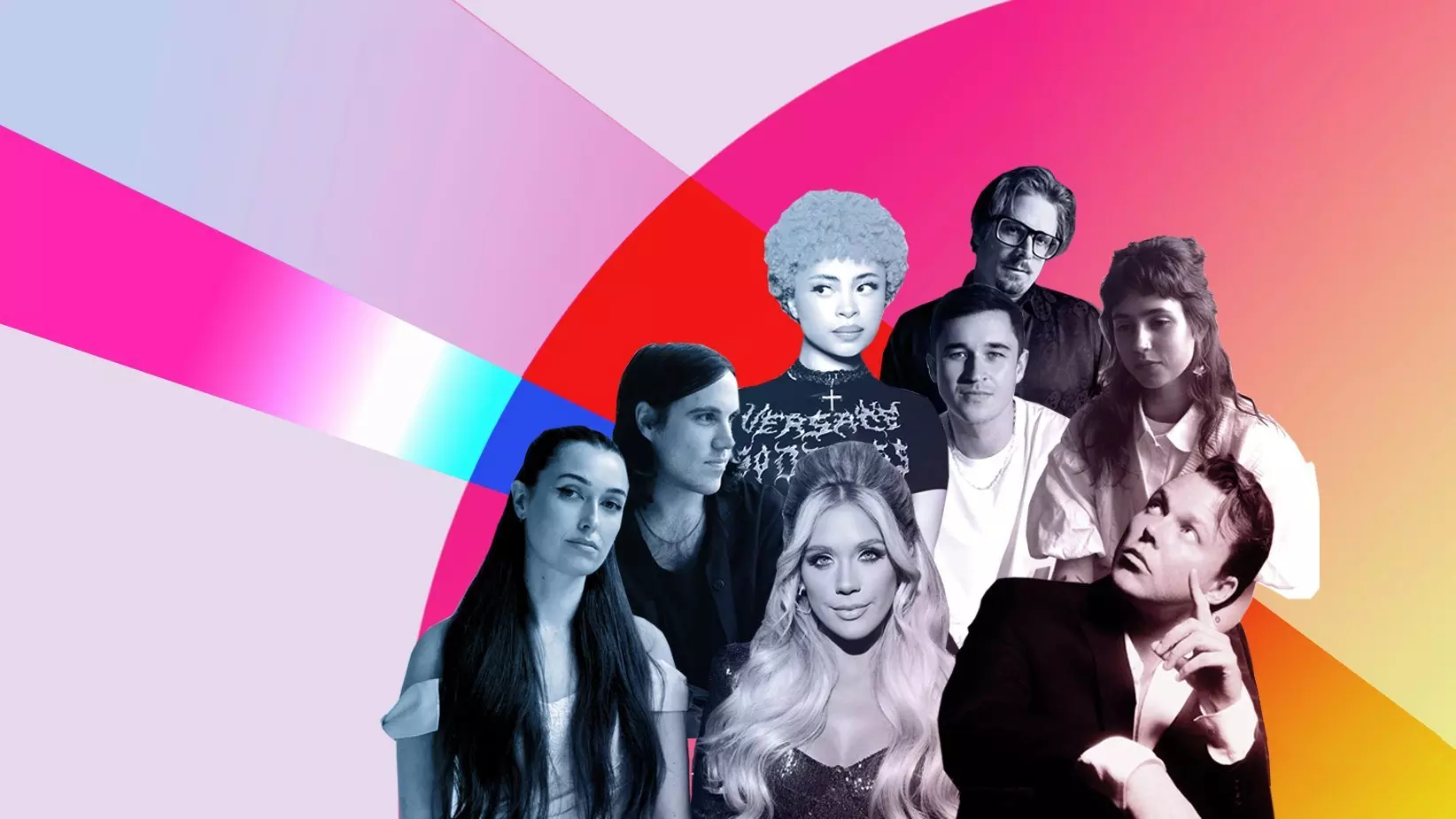
15 Must-Hear Albums In July 2024: Ice Spice, Sturgill Simpson, HARDY, BLK ODYSSY, John Summit & More
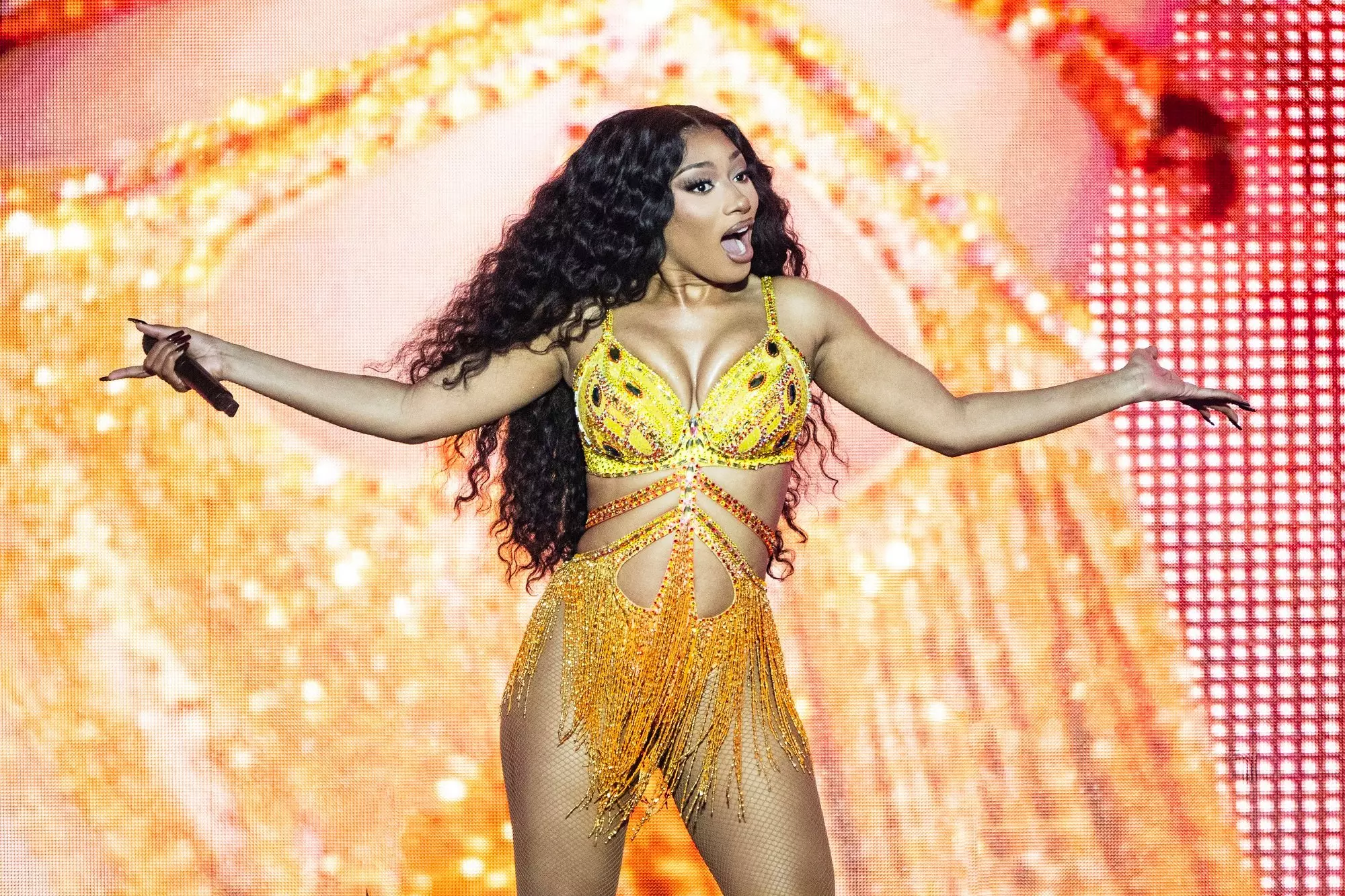
6 Takeaways From Megan Thee Stallion's 'Megan': Snakes, Shots & Self-Assurance

New Music Friday: Listen To New Songs From LISA From Blackpink, Lil Nas X, Kelsea Ballerini, MC Lyte & More
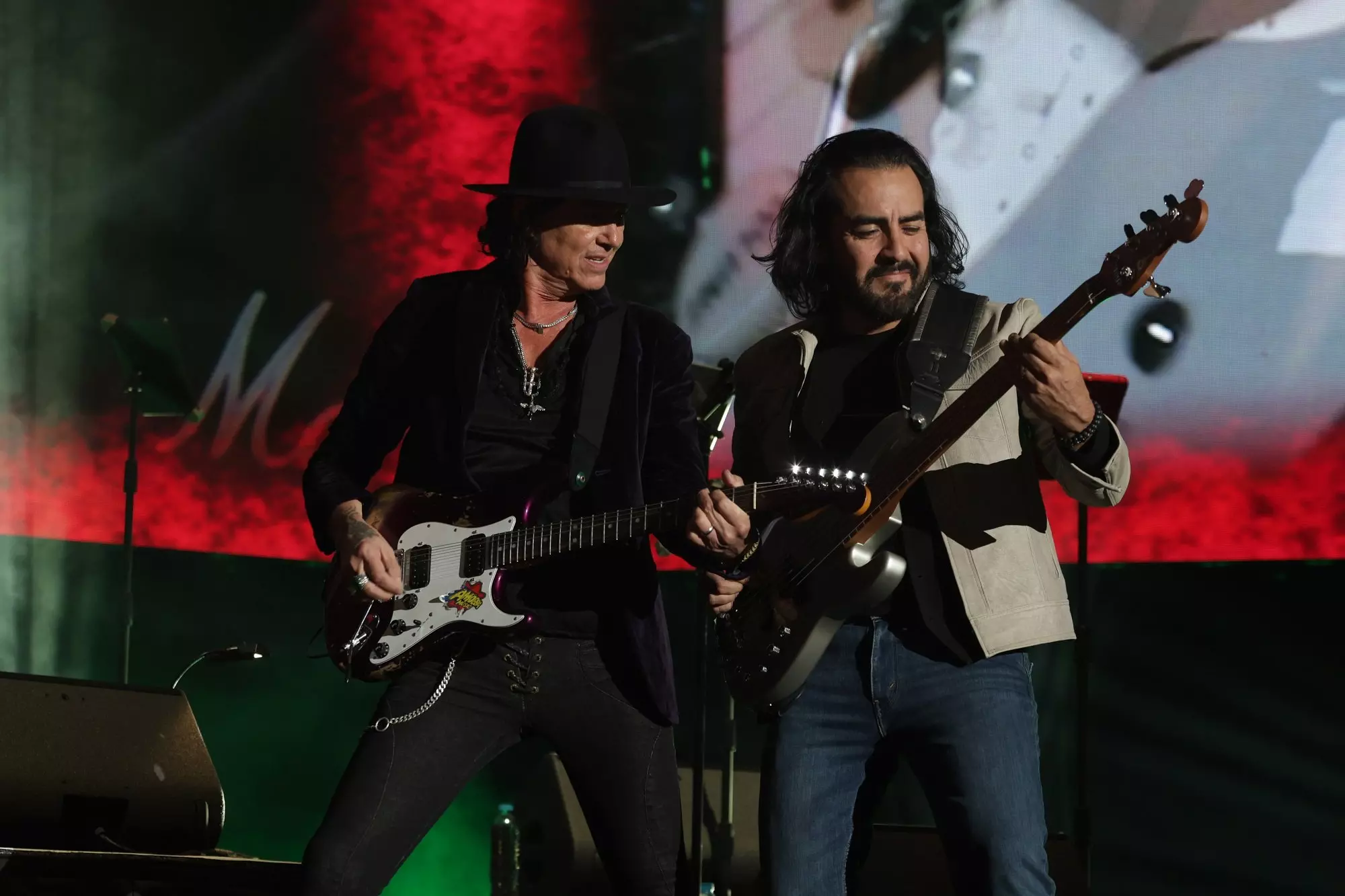
Revisiting 'El Nervio Del Volcán' At 30: How Caifanes' Final Album Became A Classic In Latin American Rock
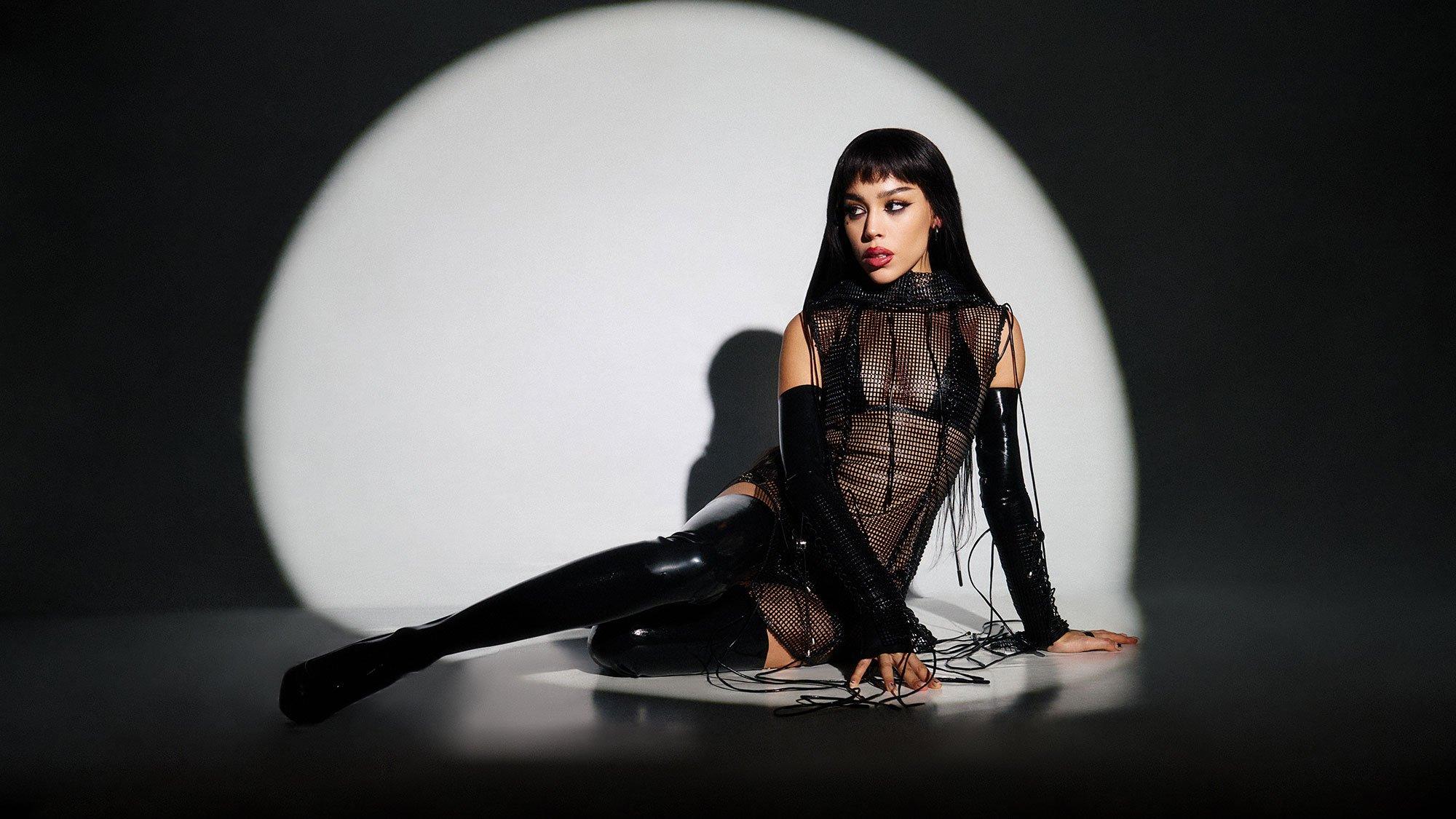
Photo: Rafael Arroyo
interview
How Danna Paola Created 'CHILDSTAR' By Deconstructing Herself
"'CHILDSTAR' is the first album in my entire career where every inch, detail, and decision are curated and made by me," Danna Paola tells GRAMMY.com. "I made an album for myself and that little Danna who has always wanted to do this."
Danna Paola feels comfortable coexisting with her shadows.
The Mexican singer, model and actress first appeared on television at age five, and has spent recent years dwelling on memories of her youth. Now 28, Danna is dismantling the myths and taboos around her artistic persona.
This process resulted in CHILDSTAR, which arrives April 11. Danna's seventh LP is her most authentic production and one where she makes peace with her childhood.
Accomplishing this freedom took her two years of therapy, the singer confesses to GRAMMY.com. "I deconstructed myself and my beliefs and unlearned many things to learn new ones. The pandemic also opened Pandora's box. That's where everything came out."
Through that self-discovery process, Danna knew she had to break with a constant that had accompanied her for two decades: acting. The last character she portrayed was Lucrecia in the Netflix series "Elite," a popular role that led her to reignite her music career after an eight-year hiatus. Beginning to live authentically, without the vices that fictional characters can leave behind, was the crucial step that led the Latin GRAMMY-nominated singer to CHILDSTAR.
CHILDSTAR follows a lengthy depression and a break from her management team, which Danna has described as controlling. On the new album, she embraces indulgence — singing about female pleasure for the first time in her career — and draws inspiration from her after-hour encounters. CHILDSTAR's darkly powerful electronic rhythms and synth-pop, tell a tale about a weekend of partying, alcohol, and sex to create the perfect escape from "your demons, your life, and your reality."
Ahead of her album release, Danna Paola discussed the processes that led her to break with her past, how her boyfriend was instrumental to her return to the studio, the synthesizer that inspired the album's sound, and the gift that Omar Apollo left for her.
This interview has been edited for length and clarity.
Tell me about the process that led you to co-produce for the first time.
This album is made with a lot of love, many hours, but above all, a lot of freedom. It's a very energetic and aggressive album, liberating.
It was a journey of introspection, empowerment, and self-confidence. Beyond being a sad story, the complete meaning of the album is not to talk and throw shade at my childhood. [It's about what] I have discovered since that first therapy session to find and make peace with my past, and that instead of being a place of embarrassment for me, it empowered me.
CHILDSTAR is the first album in my entire career where every inch, detail, and decision are curated and made by me. That's something that I am very proud of. I made an album for myself and that little Danna who has always wanted to do this.
It is energetic, super intense, and sexual. Electronic music, funk, dance, synth-pop, and R&B lead me to drain all these emotions. The choice of each song, and the details and creating them from start to finish, [has] been very cathartic.
In "The Fall," you sing, "You don't know me, you don't know s–– about me. I'm not a shooting star." Was it painful to relive the memories of being a child star?
Yes. I grew up in 2000s television. Back then, creating a child's image came from a lot of machismo: being the perfect girl, the girl who doesn't speak badly, the girl who smiles for everything, and whose characters are all good. She can't do bed scenes, can't talk about sex.
With this project, I embrace that [version of] Danna. I told that girl that everything would be fine. It's OK if you make mistakes, and it is OK to fall in love. Falling in love terrified me because I've been on different projects… every six or eight months; the longest a project lasted for me was a year. I made relationships with people and friends, [but] people always left my life. I built a pretty lonely life; I almost did not spend time with my family. I poured my life into work.
I had this distortion of reality where Danna Paola was the superheroine, and I forgot who Danna was. That's why I stopped acting; creating characters and being in someone else's skin was moving me further and further away from discovering myself as a human being in the ordinary course of life, of creating myself based on situations, emotions, and relationships.
In therapy, of course, I understood that. I made peace, and today, I am discovering many beautiful things about myself as a child that were precious, happy, and full of love. Of course, I don't blame my parents because they did their best. Nobody teaches you how to be a child star from age five.
The album led you to shine a light on your darkest sides. What did you discover about yourself and Danna as a person and artist?
I was terrified to take risks, to speak, or to create. [To me] creating a project takes a long time, at least with music. I discovered that, for me, [making music] is a spiritual act. It is an everyday practice. It is to continue to discover and continue to learn. It's falling in love again with my profession and giving the industry another chance.
I also learned that our capacity for reinvention is infinite so we can start over. Today, I also begin to be a little more human. However, I don't aspire to be an example for anyone. I want to share my experiences and the lessons I have learned so I can move forward, continue to love what I do, and not lose myself. I used to say that I wouldn't make it to 27. That was in my head.
I'm making a wonderful balance between my personal life and my work. I'm also building my family at home with my boyfriend [artist Alex Hoyer], my two little dogs, my friends, and my chosen family. It's making peace and creating the life of my dreams.
Do you like who you are now?
I love it. I continue to polish many things about my personality. I work hard to be a better human being. Life is about learning and transforming yourself. I can release another album in a couple of years; I may release another this year. I don’t want to stop making music. [I want to] continue transforming myself through my art.
In the first two tracks, "The Fall" and "Blackout," you repeat that people don't know you. How would you describe the Danna of this record?
She's a woman who is very sure of who she is, and nobody has given anything to me. I'm in love with my project, my music, and my life, and I'm enjoying it a lot.
I struggle a lot with fame, but today, I present myself as a liberated woman in a good headspace. I don't pretend to be perfect or an example for anyone. Quite the opposite; all I do is share experiences, lessons, and music.
I'm an artist in every sense of the word. I'm a creative, honest person and have a lot of love to give, and I love receiving it, too. That should be mutual. It's an energetic practice that when one really does things with love, the universe always rewards it.
In songs like "Atari" and "Platonik," you openly sing about female sexual pleasure. Is it the first time in your career that you sing about your sexuality?
Yes. This album is very sexual. There's a taboo when it comes to women talking about sex. In reggaeton, there are thousands of ways in which we can talk about sexuality. In my case, I had always considered it forbidden.
It's what I told you about the kid [actress] who doesn't [about sex], who's a virgin until marriage. There is no richer pleasure than sex and the sexual pleasure you can have as a woman. There's liberation, to feel good about yourself, with your body, and also the sexual education that I can also share with generations.
This liberation with my femininity is something that I also discovered: The pleasure of being a woman and having many experiences in my life that have led me today to enjoy who I am, to have a happy sex life, and to share it through my music.
In "Platonik," you discuss sexualizing a platonic relationship with a woman and sing "I can't help what I think in my bed." Why was exploring that relationship important to you?
I had a platonic love with a girl at a stage of my life. I kept this to myself; it was a personal experience that opened the conversation to a beautiful story.
I wrote this song with [producer and songwriter] Manu Lara. We made it in half an hour. This song has something unique because, besides talking about a personal experience that is also super sexual, it talks about universal love.
That's why I say that CHILDSTAR is an album of many stories that have marked my life and beyond, talking about only the childhood stage, which is what everyone speculates, but that's not the case.
You’re flirting more with synth-pop in this album. What caught your attention about this genre?
It comes from this aggressive part of saying, here I am. For me, electronic music connects and drains emotions. Every time I've been out partying, electronic music has been liberating for me, and when I put it together with pop and these lyrics, it has become a new way to enjoy the genre.
While creating CHILDSTAR in Los Angeles, I fell in love with a Jupiter [synth] we found at Guitar Center. That synthesizer is in every song. The inspiration [to use the instrument] comes from John Carpenter's synth album [Lost Themes III: Alive After Death]. In it, I discovered synthesizers had a way of incorporating sound design and darkness into the album.
[Synth-pop is] the expression of that need to bring out the energy I had stuck through music. It’s an emotional purpose, the connection I have with electronic music.
Your boyfriend, Alex, was instrumental in making "XT4S1S" when you didn’t want to enter a recording studio. How was reconnecting with music with help from your romantic partner?
"XT4S1S" is the song that, to both of us, as a couple and as producers, connected us on a hefty level.
I was super blocked. It took me several years to get out of my depression hole. We returned one day from [La Marquesa park] here in Mexico, and started chatting. Alex opened his laptop and started pulling out a beat.
I started throwing melodies, and [shortly] we had the chorus. It brought me back to life. I started crying with excitement because I finally felt again these desires and this emotion that you feel when you create a song, and you can’t stop moving forward and keep creating.
I remember we recorded my vocals on a voice note and sent it to [the production software] Logic. Then, it took us four months to produce this song because it was a lot of discovery, in this case, for me as a producer.
Alex is a great musician, artist, a genius — and I don’t say that because he’s my boyfriend. Artistically, there’s a fascinating world inside his head that I have learned a lot from.
The track "Amanecer," which features Omar Apollo, breaks dramatically with the story you tell in the album. Why did you end that party cycle with a more folksy, chill song?
"Amanecer" is a track that has us all in love. It was the last song I recorded for the album.
I wrote it to my ex. On my birthday, he called me — I was already with Alex — and it was super weird. I always feared running into him on the street, seeing him with someone else, and feeling something. And it was the exact opposite. I had already healed internally, and that wound had stopped hurting. I stopped feeling all the emotions I had gone through in K.O., [the album nominated for Best Vocal Pop Album at the 2021 Latin GRAMMYs].
This song talks about knowing how to make peace and understanding how to let go. It’s the dawn of the album. It’s perfect to release all the drama, and all the intensity, and aggressiveness that is the entire album itself.
[The song invites you] to hug yourself and say everything will be fine. There is always an opportunity to start over.
It also has a beautiful story. Manu [Lara] taught Omar Apollo the instrumental parts of the song, and he made some melodies. At the moment of receiving them, [Omar] agreed we would make a song together, [but] it was almost impossible to record together.
[Instead, Omar] told me "You can use the melodies I made" and left me the last part of "Amanecer." He left us with that magical essence.
10 Women Artists Leading A Latin Pop Revolution: Kenia Os, Belinda & More
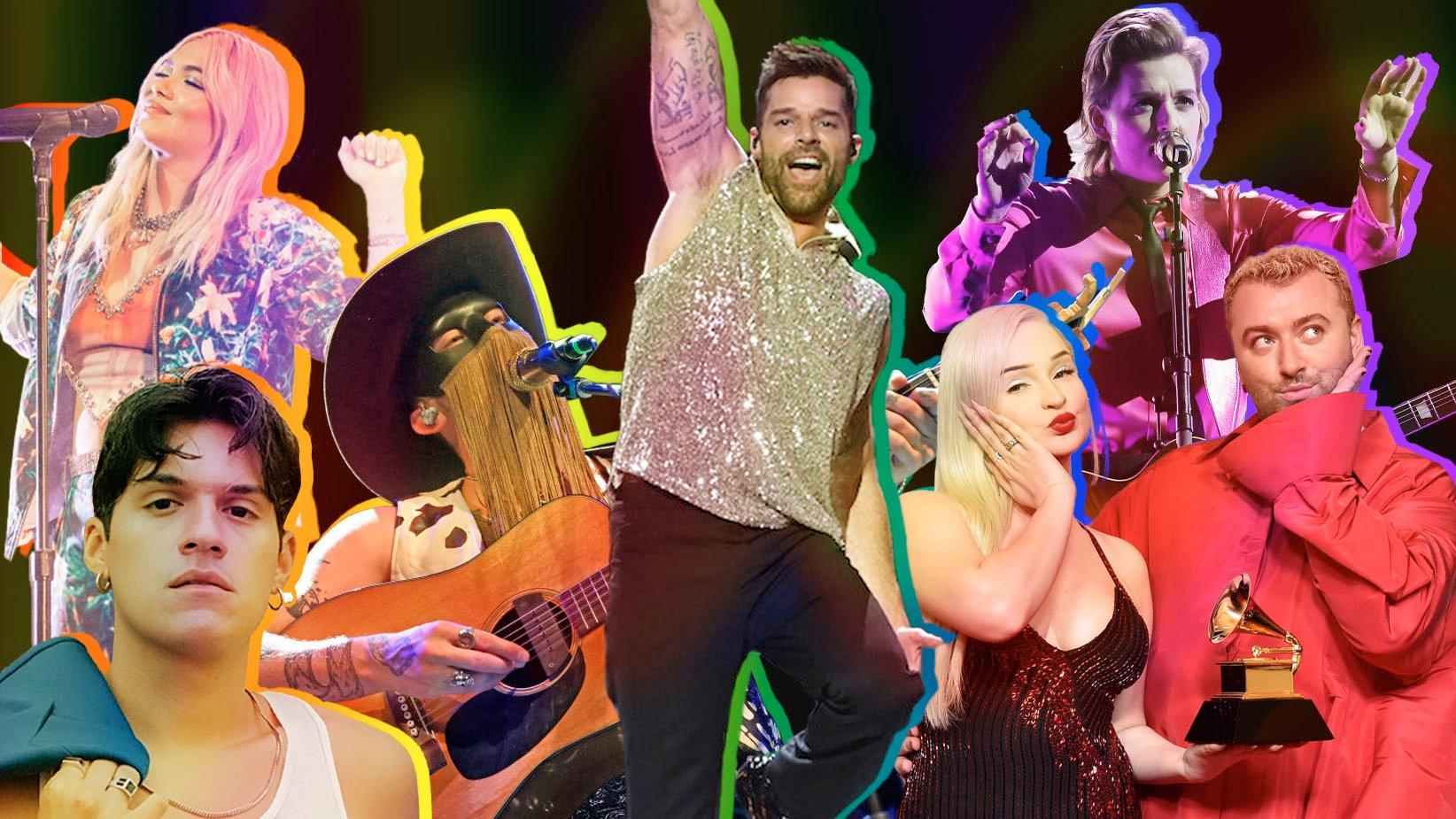
Photo: Kristy Sparow/Getty Images, Kevin Winter/Getty Images for LARAS, Kevin Winter/Getty Images for The Recording Academy, Alberto E. Rodriguez/Getty Images for The Recording Academy, Stephen J. Cohen/Getty Images, Gustavo Garcia Villa
news
Listen To GRAMMY.com's LGBTQIA+ Pride Month 2023 Playlist Featuring Demi Lovato, Sam Smith, Kim Petras, Frank Ocean, Omar Apollo & More
Celebrate LGBTQIA+ Pride Month 2023 with a 50-song playlist that spans genres and generations, honoring trailblazing artists and allies including George Michael, Miley Cyrus, Orville Peck, Lady Gaga and Ariana Grande and many more.
In the past year, artists in the LGBTQIA+ community have continued to create change and make history — specifically, GRAMMY history. Last November, Liniker became the first trans artist to win a Latin GRAMMY Award when she took home Best MPB Album for Indigo Borboleta Anil; three months later, Sam Smith and Kim Petras became the first nonbinary and trans artists, respectively, to win the GRAMMY Award for Best Pop Duo/Group Performance for their sinful collab "Unholy."
Just those two feats alone prove that the LGBTQIA+ community is making more and more of an impact every year. So this Pride Month, GRAMMY.com celebrates those strides with a playlist of hits and timeless classics that are driving conversations around equality and fairness for the LGBTQIA+ community.
Below, take a listen to 50 songs by artists across the LGBTQIA+ spectrum — including "Unholy" and Liniker's "Baby 95" — on Amazon Music, Spotify, Apple Music, and Pandora.
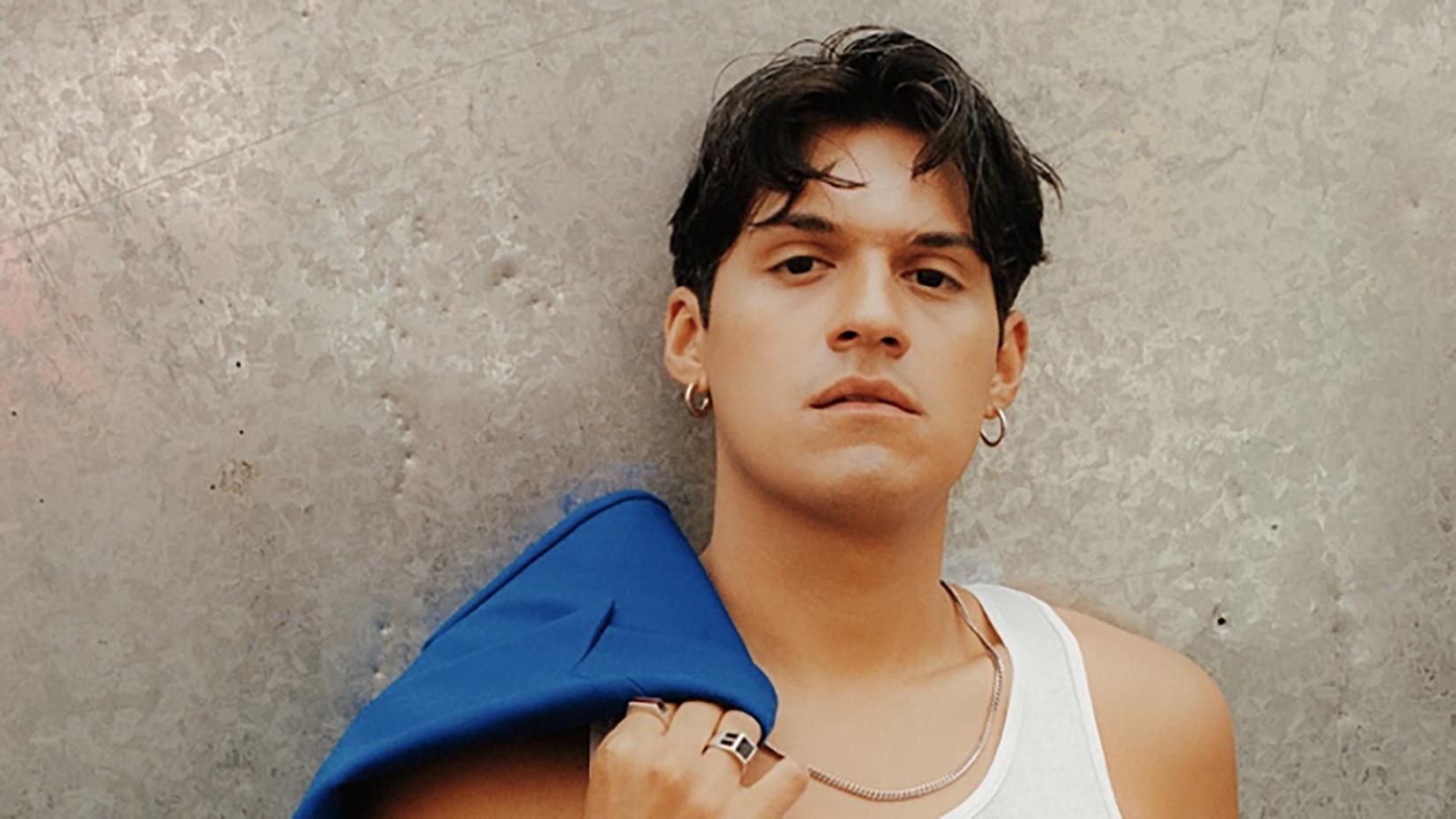
Photo: Gustavo Garcia Villa
interview
Meet The First-Time GRAMMY Nominee: Omar Apollo On “Evergreen,” Growth & The Art Of Longing
Omar Apollo sings, raps and dances. No matter what the Best New Artist nominee does, he does it with soul.
Omar Apollo’s career began with a stolen guitar. It almost ended with one, too.
The self-taught musician, then 14, had been playing for two or three years when robbers took his beloved instrument from the family car after a gig. With no money to replace it, Apollo took up dancing and worked various jobs while in high school. He had let his music-making days go — until one day he couldn’t anymore.
"The feeling overwhelmed me," he tells GRAMMY.com. "Music had taken over the part in my brain that needed to be creative." He went to a pawn shop and bought another guitar.
Following that feeling served him well. Apollo uploaded his song "Ugotme" to Spotify in 2017 and it was quickly blew up after being placed on a Fresh Finds playlist. Over the next three years, he released two EPs and a mixtape — Stereo (2018), Friends (2019) and Apolonio (2020) — which showcased his wide range of sounds including funk, pop, disco, R&B and Spanish corridos. Apollo’s dreamy croons and wistful lyrics about love (or lack of it) were a raw new voice to the youth experience of putting words to yet-unplumbed feelings. The son of Mexican immigrants, he also became a relatable figure for fellow first-generation Latinos.
This past year has been especially momentous. In April 2022, Apollo released his debut album, Ivory, which features Kali Uchis ("Bad Life"), Daniel Caesar ("Invincible") and production by the Neptunes ("Tamagotchi"). Another single from the LP, "Evergreen," went viral on TikTok, earned him his first placement on Billboard’s Hot 100 chart and currently boasts over 118 million Spotify streams. It’s all culminated in a Best New Artist nomination for the 65th GRAMMY Awards.
Of course, these achievements didn’t all come easily. Behind the scenes, he reckoned with scrapped albums, tight deadlines and the type of overthinking that can crumble any artist’s career. Yet these hurdles only helped Apollo sharpen his vision — and he’s just only getting started.
How did your parents react to your nomination?
My dad was like, "Congratulations." My dad’s thought every single award was a GRAMMY nomination. So like, I won an award recently and he's like, "I heard you got another GRAMMY, mijo." And I was like, it wasn’t a GRAMMY [laughs]. It was so fun. My mom instantly was like, "What are we wearing?"
Are you bringing them to the GRAMMYs?
Of course.
As a fellow child of immigrants, I think we're very aware of the sacrifices that our parents made to build the life that we have now. How does that impact you?
With my parents being from Mexico, then coming here so their kids could have a better life, there's that pressure of needing to be successful or wanting to be — not so much in a creative way; more like, no, you go to college and get a job, that kind of thing.
But honestly, the feeling to make music was far greater than the pressure. I didn't think of it as a career; it just kind of snowballed into one. It was tough for them at first to understand. If I was living in Mexico and crossed the border illegally so my kids could have a better life, and then my kid wakes up one day and is like, oh, I wanna be a singer, I would be stressed out too. So I never blamed them for it. Now I have a great relationship with them.
How do you feel about the general Best New Artist category?
I'm happy to be recognized as new [laughs]. I wake up every day and just think about the future, and wanting to keep making music and progressing. Some people are like, you've been touring for a while, but I honestly feel like I'm barely getting started. It's just wonderful to be recognized, and with other great talented artists that I've known about and really like their music, too.
Ivory almost didn't happen in its current state. Why did you scrap the first version of the album, and how did you know you were on the right track for this one?
I scrapped the first album because I hated it. I wasn't excited to perform it. Everything was post-rationalized; it didn't have any theme. It was just me linking up with a bunch of producers and then putting whatever happened in those two months all together. It didn't feel like me by any means. It wasn't made on my laptop while I've been making music; it was on everyone else's computers. It was just weird.
I learned so much from working with other people that I don't regret that at all. It also led me to making an album that I was proud of. So after I realized that it was an album that I didn't like, I made a new one in like three months. I booked houses in Idyllwild and Greenpoint in New York and just isolated myself, just took everything I learned. Very few people were involved in that process. I didn't even play it for my manager or nobody until it was done. I think that boundary really made all those songs into what they are.
Three months to make a new album sounds incredibly stressful. Do you find that you thrive in periods of crunch time?
That was definitely my most stressful time with music for sure. It was very dark. I felt like I was gonna burn a bridge with my label. But I got so much done. I made a hundred songs in three months and cut it down. Now I don't think I need to do that.
Now it's not so much discovery, it's more execution. Discovery can take years, you know? I think that the process of Ivory and me releasing it gave me so much to learn from next time I'm in the process of writing.
Like what?
Themes, tones, overall cohesiveness and making an album. I could be like, this album is about this as opposed to doing 10 different genres. At the heart of everything that I do, I feel like there's soul even when I'm rapping. I think that's when I realized it's the type of music that I wanna make and play forever.
Did you expect "Evergreen" to take off the way that it did?
I don't think any of us did. It's so funny 'cause I always hear people talk about, when the song goes big, they're like, "we never knew." But we genuinely never knew. We even had a conversation when we were doing the splits of the song. It was me, Manny [Barajas], and Teo [Halm], and something came up along the lines of like, yeah, this isn't gonna be like, the song [laughs]. It’s just funny that it was.
Why do you think it resonated with so many people?
There was a giant release on that song and it almost didn't happen. The bridge is the release, the thing that ties the whole song together. Otherwise, it would just be a very sad song. I think that the part where [I sing] "You didn't deserve me at all" — just the way that it was set up and done — people could relate to it.
It's a feeling that we've all felt in a relationship where it's just like, you tell yourself things to get over it and move on. One of those things is like, you didn't deserve me and the love I had to give.
I personally love "En El Olvido." Have you thought about making an album entirely of corridos or an all Spanish language record?
I totally have. I don't know how I would do it though. Right now I'm focused on writing. I'm going to the studio every day; I'm probably gonna go after this. There's just things I have to get out first, but who knows, they might develop or change. I just try to honor the inspiration that I feel and get it out as much as I can.
What's inspiring you now?
I've become obsessed with synthesizers; I just got one that I've been making every song on. And analog, '70s stuff. The atmospheric tones from that era have been inspiring me. I've been listening to a lot of Brian Eno, a lot of ambient [music].
I made a playlist, it's four hours long, that I spent like eight hours making one day in the green room. I was doing a show and just made like a whole… all of my knowledge of ambient music and even new stuff, just altogether in one thing. I don't know why, I've just been really drawn to that ambient feeling. I want to be able to sing over it because I love how it makes me feel. I want to amplify that feeling, that atmosphere, that world. Just be engulfed in it.
Tell me more about that world.
It slows everything down for me. I feel like when you're on the road and you have to constantly be perceived, it gets kind of heavy and then you start overthinking every interaction. Even the ones that aren't being recorded. That music puts me to sleep at night and makes me feel like everything's okay.
Longing has been a major theme in your work. What is longing to you and why is it so dominant in your music?
Living in a state of longing is probably some of the most intense moments that I've had and the ones that I remember. Always traveling and not being able to have a conventional relationship as much as I'd like to. I've accepted longing as a feeling and, instead of being sad about it, I just like to live in it, I like to bask in it. It’s like a Freudian slip. Whenever I talk about longing, it's just there, like a sadness that I love to carry.
I feel that. When you talked about how Pedro Infante’s "Cien Años" was foundational to your understanding and love of corridos, as soon as I read that I had to listen to it. It's still stuck in my head.
It's so good, man. Especially when you're longing for somebody but you know you’ll see them again. The longing of someone unrequited is what sucks. That one I don't like [laughs]. But the longing of somebody's presence, wanting to see them, be around them, see how they react to the simplest things. You get joy from it. That's the part I miss.
You're big on manifestation. In the last few years you've manifested two "Tonight Show" appearances, a Coachella gig and possibly this Best New Artist win. So let's put it out there: What else do you want to manifest?
What I want to manifest ultimately is being able to say what I wanna say in the most poetic way. That's all I really think about, is just being able to put words to these feelings that I get, and make something that I'm proud of.
